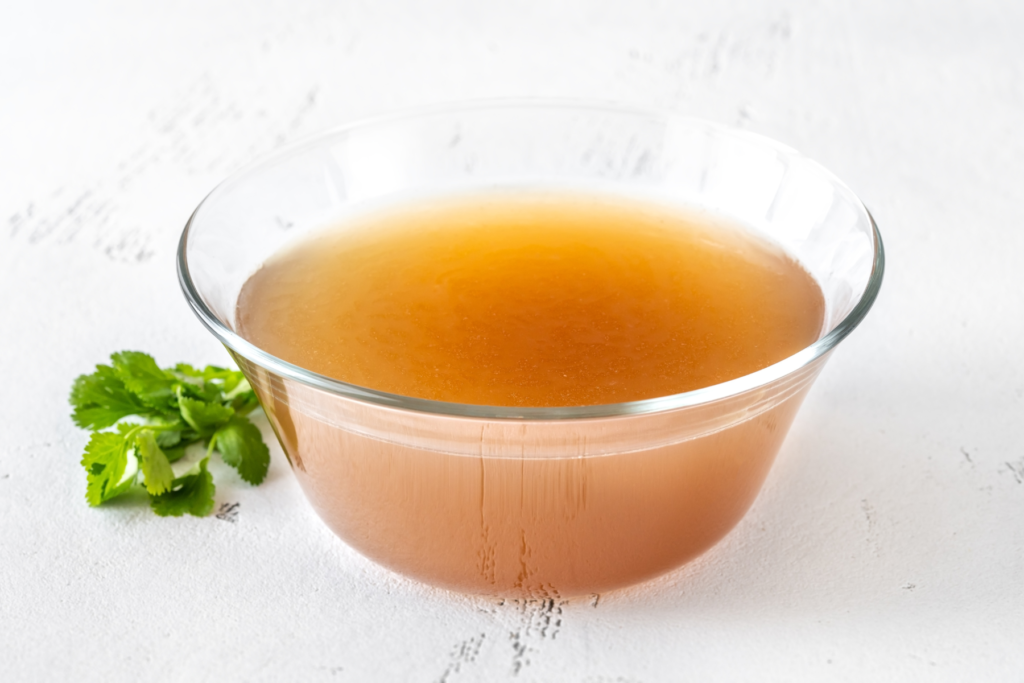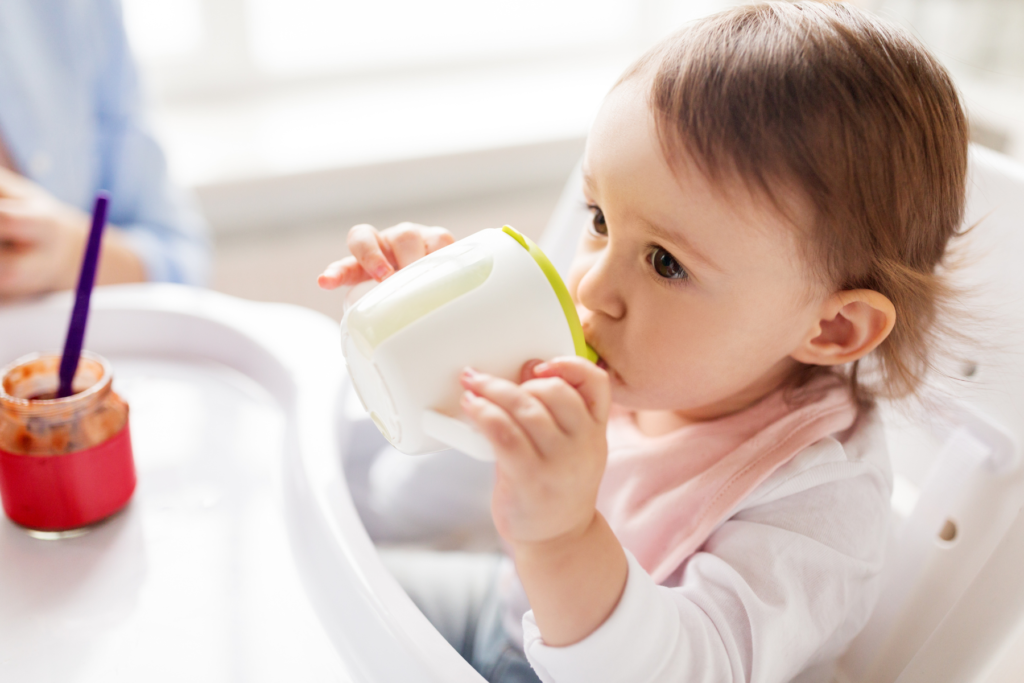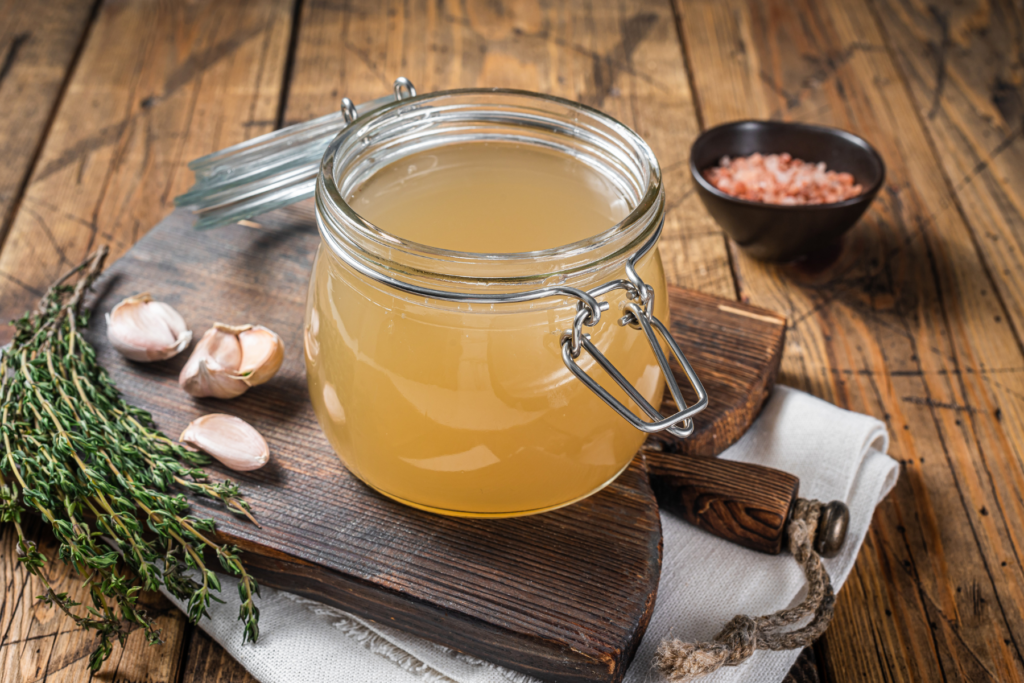Bone Broth for Babies



What is Bone Broth?
Bone broth is a liquid made by simmering bones, typically from beef, chicken, or fish, in water for an extended period of time. It has many proposed health benefits that include promoting gut health, supporting the immune system, and reducing inflammation.
But should you give it to your baby?
Pros and Cons of Bone Broth for Babies
Pros:
- Contains protein, collagen, proline, glycine, glutamine, magnesium, calcium, phosphorous, vitamin D, vitamin K, and amino acids.
- May heal damaged gut tissue, support the immune system, and reduce inflammation.
- Provides protein and fat which can be helpful if lacking in the child’s diet.
Cons:
- Only contains trace amounts of some of the most important nutrients needed during the first few years of life.
- High in sodium, which is recommended to be limited especially in children under 12 months of age.
- Limited data to support health claims.
- Currently, no data on bone broth intake in children.
- May contain high levels of heavy metals which could be especially dangerous in young children.
Does it have the nutrition my baby needs?

What does the research show?
There are limited scientific literature on this topic, but here are some that are out there:
Gut Health/Inflammation
One study on mice showed decreased symptoms of Ulcerative Colitis with consumption of bone broth. No human studies available that provide a direct correlation with bone broth intake and digestive health. No studies on children. (Mar-Solís L. et al. 2021)
Immune Support
Observations showed that chicken broth hydrolysate supplements exhibit considerable potential for preventing immune system suppression in mice. No human studies available showing direct correlation with bone broth intake and immune support though we do know that many nutrients found in chicken broth (vitamin C, zinc, selenium, vitamin D) are helpful in promoting immune health. (Zhang, J. et al. 2022)
Heavy Metals
One study found chicken broth to have markedly high lead concentrations. “In view of the dangers of lead consumption to the human body, we recommend that doctors and nutritionists take the risk of lead contamination into consideration when advising patients about bone broth diets” (Monro, J, Leon, R, Puri, B, 2013).
Summary:
We just don’t have enough evidence to support the health claims at this time. They may all be 100% true and bone broth may be a magical cure-all, but we don’t have the scientific proof at this time.
How do we apply this information?
- If you want to provide bone broth, use small amounts in cooking and preparing meats, veggies, or homemade purees
- Avoid providing bone broth as a beverage
- Limit the total amount of bone broth you provide daily to less than 1-2 ounces
- Choose low sodium options
- Check nutrition label to make sure all ingredients are safe for baby
- Make sure to prioritize milk feeds and a nutrient dense diet full of iron-rich and healthy fat foods
Bone Broth for Toddlers 1-3 years of age:
- If you would like to provide bone broth as a beverage, provide alongside a balanced diet and avoid serving excessive amounts
- If concerned with low protein intake, use bone broth when cooking grains, pasta, and veggies
- Choose low sodium options whenever possible
- Focus on a balanced diet, ensure adequate fluid intake, and make sure to include calcium-rich foods or beverages
Is this just a trend?
Have you seen the trend? I have been scrolling across this quite a bit on TikTok – mothers provide bone broth right when starting solids to add what they feel is beneficial nutrients to their babies diets, or completely skipping weaning to a milk or fortified plant-based milk when their child reaches the age of 12 months in lieu of bone broth.
In my opinion, all foods (for the most part) can be included in moderation and a balanced diet should be focused on versus one singular food.
The current beverage recommendations from the AAP are that no other beverages other than breast milk, formula, or water should be provided to children under the age of 12 months. This is to avoid other beverages taking away from the very important nutrient composition of breast milk or formula needed for proper growth and development. After the age of 12 months, if you would like to include small amounts into your child’s diet, I don’t see a problem with that.
Due to the concerns for excessive levels of heavy metals in bone broth (specifically, lead), I would avoid providing large amounts of bone broth to young children.
If opting to avoid dairy or fortified plant based milk options, ensure you are providing calcium rich foods like broccoli, sardines, spinach, calcium fortified tofu, collards, almond butter, etc. to ensure the 700mg of calcium/day is being met. Bone broth only contains small amounts of calcium and should not be relied on to meet calcium needs. For more on calcium, take a look at this blog post on How to Meet Calcium Needs for Toddlers (1-3 years old).
Despite its popularity and the numerous medicinal claims, there is very little scientific research regarding bone broth. I searched the scientific literature and could only find a few studies that were relevant.
That being said, bone broth may have these benefits and we just don’t have credible data to back it up yet. Everything in moderation will continue to be my slogan. We currently do not have data on bone broth intake and impact on growth in young children. Until we do, I am sticking with my recommendations!
Citations:
- Mar-Solís LM, Soto-Domínguez A, Rodríguez-Tovar LE, Rodríguez-Rocha H, García-García A, Aguirre-Arzola VE, Zamora-Ávila DE, Garza-Arredondo AJ, Castillo-Velázquez U. Analysis of the Anti-Inflammatory Capacity of Bone Broth in a Murine Model of Ulcerative Colitis. Medicina (Kaunas). 2021 Oct 20;57(11):1138. doi: 10.3390/medicina57111138. PMID: 34833355; PMCID: PMC8618064.
- Monro JA, Leon R, Puri BK. The risk of lead contamination in bone broth diets. Med Hypotheses. 2013 Apr;80(4):389-90. doi: 10.1016/j.mehy.2012.12.026. Epub 2013 Jan 31. PMID: 23375414.
- Zhang J, Wang X, Li H, Chen C, Liu X. Immunomodulatory Effects of Chicken Broth and Histidine Dipeptides on the Cyclophosphamide-Induced Immunosuppression Mouse Model. Nutrients. 2022 Oct 25;14(21):4491. doi: 10.3390/nu14214491. PMID: 36364753; PMCID: PMC9659005.
Want more? My course is a 100% evidence-based approach to starting solids in a way that encourages a healthy dietary pattern from the start.
Check out the Starting Solids 101 Course now!
Access Course Now

Cinthia Scott is a Registered Dietitian (RD) and International Board Certified Lactation Consultant (IBCLC) with over 10 years experience in the field of dietetics. Cinthia focuses on ensuring optimal nutrition in the first 1000 days of life to ensure optimal growth and development as well as set the stage for long-term health. Cindy is an author, starting solids expert, and advocate for caregivers receiving evidence based education and support surrounding breastfeeding and starting solids.
Cinthia is co-author of the 101beforeone Starting Solids Book, “101beforeone -baby-led feeding cookbook,” and is the founder and owner of The Baby Dietitian LLC which is her private practice built to provide virtual 1:1 services for caregivers surrounding infant nutrition, toddler nutrition, and breastfeeding support. Cinthia is also the creator of the Starting Solids 101 Program which provides caregivers 1:1 support from a Pediatric Dietitian on how to provide optimal nutrition from the start and create healthy eating habits that will last their whole lifetime. To work with Cinthia, you can access her services here.
Cinthia provides tons of free information for parents on her social media accounts as well.
- Instagram: @The.Baby.Dietitian
- Tiktok: @The.Baby.Dietitian
